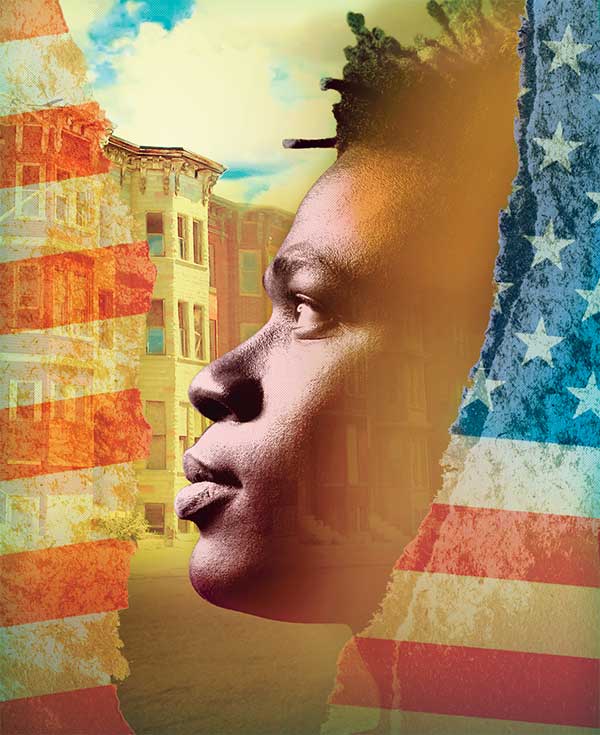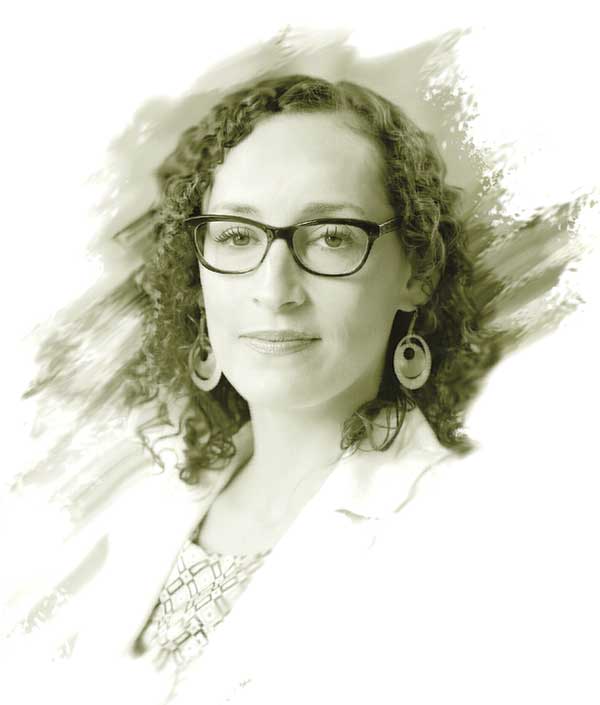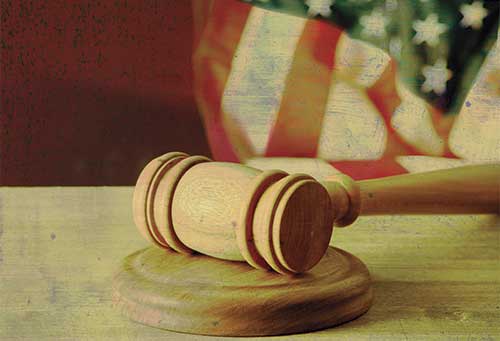
When Vesla Weaver explains why her political science research builds on “deep listening,” she can hear the urgent voice of the late William Steffens relating a family story that’s more than a century old.
The 87-year-old man is describing the fear and confusion of his own father in 1863 as the 10-year-old boy fled his home in “backwoods Georgia,” hounds yelping and guns firing. His family had just learned that Abraham Lincoln had freed them from slavery months before. They knew this, Steffens emphasizes, only because another Black man, posing as a seller of goods, risked his life to bring them, and other formerly enslaved people, the news of the Emancipation Proclamation in a copy of the document secretly plastered to his chest.
It’s a story, and a voice, you don’t forget. And Weaver says she often listens to that 1984 tape from the University of Kentucky’s oral history collection, as well as several others, to more fully absorb the roots of the racial injustice she is writing about in her book in progress, The State from Below: Racial Authoritarianism in U.S. Democracy.
“There’s more you discover when you can actually hear people’s voices,” says the Bloomberg Distinguished Professor of Political Science and Sociology. “This tape is incredible. You hear the intergenerational collective memory in the connections William Steffens makes between his own escape from the South and his father’s. When you listen to this, you ask yourself: How could we possibly capture this account of racial authoritarianism through statistics like numbers on political violence or numbers of people incarcerated?
“You can’t. You have to hear the terror of the person running through the fields, the person who was [officially] free—but not safe.”
Oral Histories from Across America
Weaver has gathered hundreds of other oral histories that offer similar insight into political truths. Using oral history archives as well as contemporary interviews, she and co-author Gwen Prowse, of Tulane University, are mining the experiences of a broad sweep of Americans: prisoners and their families, police officers in Chicago, former domestic workers, railroad workers in Maine, activists in Alabama, generations living in disinvested neighborhoods. The goal is to reveal how race-class subjugated Americans experience the state, and how their experiences reveal the necessity for different theoretical frameworks to understand them.
Over the past decade, Weaver’s research has shown how state policies and institutions shape political life and identity through the increased use of punishment and of instruments of surveillance, such as police helicopters and cameras in certain neighborhoods and metal detectors in schools.
According to The Sentencing Project, as many as one in three U.S. adults have criminal records. Many others, although they were never convicted, are still subject to surveillance. Weaver says the overreach of the system has defined the relationship between citizen and state, resulting in a sizable group of people whose experience of their own streets and neighborhoods is completely different from that of those not living under police surveillance.
The American Prison Writing Archive
Her newest project builds upon groundbreaking work in previous books Arresting Citizenship and Creating a New Racial Order.
Supported by $2.3 million from the Mellon Foundation, Weaver has recently brought The American Prison Writing Archive, a digital collection of more than 3,300 essays by incarcerated people, to the Sheridan Libraries on the Homewood campus. Founded by co-director Doran Larson at Hamilton College, APWA is the largest such trove in the world. Hopkins students have already used it to present research on topics such as the experience of prisoners during COVID-19, and how prison regulations prevent incarcerated people from accessing educational and self-help programs.
“It’s very special to have this archive here because there’s nothing like it—nothing,” Weaver says. The collection tells the story of incarceration by those with a first-person viewpoint, providing a true measure of the human costs of legal punishment, shifting public understanding, and bringing those incarcerated into the public sphere. “It will be a resource for researchers, a resource for policymakers, a resource for families who have loved ones incarcerated.”
Society’s Contradictions
Long before Vesla Weaver earned her PhD in government and social policy at Harvard, long before her work was supported by preeminent institutions such as the Andrew Carnegie Foundation and the Brookings Institution, the scholar remembers being inspired by stories about the origins of her own family.
Her parents met in the 1960s when her Black father attended a predominantly white high school in northern Virginia; her mother was of Norwegian ancestry.
“My father was a real estate developer and his father built the first Black homeownership communities in northern Virginia in the 1950s and 1960s,” she says. “My grandfather was descended from Mortimer Weaver, a white Confederate soldier, and a Black [formerly enslaved] woman named Margaret Holmes. They had nine children together.”
She points out that Robert Weaver, Jr., one of Mortimer and Margaret’s grandchildren, became the nation’s first Black Cabinet member when President Lyndon Johnson appointed him Secretary of Housing and Urban Development in 1966.
“So I grew up hearing that story,” she says. “But I also grew up in Vienna, Virginia, a very unequal area of the country.” Fairfax County is the second richest county in the United States, according to the World Atlas.
Disparate Life Experiences
She grew more aware of society’s contradictions as a student at the University of Virginia, when she reviewed studies about Black youth whose parents were incarcerated.
“Statistics would later show that if you turned 14 in the 1990s, and you were born to Black parents and your parents didn’t have a high school education, it was very likely that one of them would be incarcerated at some point during your youth,” she says.
“In fact, it was so common that Black youth were just as likely to have a mother incarcerated as white youth were to have a father incarcerated.”
By the time she was in graduate school, Weaver was arguing that punishment and surveillance were central to American citizenship in the modern era, and that they had become a key aspect of how racially subjugated citizens interact with government.
She began to study what it meant when “entire demographic groups and communities” were experiencing government for the first time through their encounters with police and other disciplinary interactions taking place in schools, community centers, probation offices, and housing.
“What does that mean for our ideas of political socialization?” she now asks her own students. “About what citizens learn about their government? About whether to trust it? Whether to vote?”
She says the conventional view of American politics pointed toward a benevolent, representative, “fair-according-to-the-Constitution” government that didn’t exist for people she was encountering. In 2015, as a faculty member at Yale, she served as founding director of Yale’s Center for the Study of Inequality.
Portals Between Communities
After coming to Hopkins two years later, Weaver helped introduce Baltimore to Portals, a dialogue-based initiative she and other researchers also operated in heavily policed neighborhoods in Newark, Los Angeles, Chicago, Milwaukee, and Mexico City.
Over the course of the program, community residents shared frank conversations about their interactions with police at taped sessions usually held inside special shipping containers. Baltimore’s Portal Policing Project sites were located at Lexington Market and Station North.

When we really listen to how criminal justice is experienced, and how policing is experienced on the ground, the portrait that begins to emerge is of something that bears almost no resemblance to the formal laws.”
—Vesla Weaver
“When we really listen to how criminal justice is experienced, and how policing is experienced on the ground, the portrait that begins to emerge is of something that bears almost no resemblance to the formal laws,” Weaver said about the program in 2020.
Now she and co-author Gwen Prowse are using those testimonies as a source for their upcoming book.
Collective History
Weaver says such work goes way beyond the social surveys that many in her field still rely on to test their hypotheses.
“You are using a massive amount of testimony from many areas of the country and very different historical eras in order to try to build a theory. It’s taking what thousands of people say, and using the collective pieces to build up something that we haven’t known before.”
She mentions, for instance, historic first-person accounts from members of the Afro American Patrolmen’s League in Chicago, a group established in 1968 to defend and protect people in Black communities.
“That’s a very forgotten history,” she says. “[The league] had strict rules about use of force, trying to rally against its arbitrary use. We’re writing an entire chapter on how officers themselves within a system of racial authoritarianism describe the system.”
Recognition and Worth
Her research also plumbs a pattern in people’s testimony that reveals a little-understood foundation underlying mistreatment that she labels “mis-recognition.” “It’s people who are talking about the state not ‘knowing’ them—not understanding their struggles, not having regard for them, only seeing them as dangerous and fit for surveillance.
“In the 1930s, 1940s, 1950s, and 1960s and today, there’s a very consistent way that people describe not having affirmation of worth, not having full citizenship, having to move in certain ways, having to adopt certain kinds of habits and styles of dress, not being able to walk through certain neighborhoods. Conditions have changed, legal justifications have changed, but the experience [today] is remarkably similar,” she says.
“I grew up being taught that we have the Bill of Rights and certain constitutional protections. But there’s one population whose lived experience shows that ‘No, actually, we don’t get freedom of assembly. We don’t get free movement.’
“And what’s hard for a lot of people to swallow is that this is actually an institutional arrangement [of racial authoritarianism], one of the most long-standing institutional arrangements in our democracy.”
Asking Different Research Questions
Prowse, co-author on The State from Below, is one of Weaver’s former graduate students at Yale and a fellow researcher on the Portals Policing Project. An assistant professor in political science and Africana studies at Tulane University, Prowse says Weaver’s work has been essential for helping scholars of U.S. politics to see race-class-based coercion as a central feature of U.S. democracy.
“Once you view forms of race-class subjugation as endemic features instead of tweakable aberrations, you begin to ask different research questions. You take new methodological approaches. You approach research with a different type of urgency and rigor.”
Once you view forms of race-class subjugation as endemic features instead of tweakable aberrations, you begin to ask different research questions. You take new methodological approaches. You approach research with a different type of urgency and rigor.”
—Gwen Prowse
Prowse says Weaver helped her to trust her own scholarly instincts. Prowse grew up in a low-income single-parent household in New Jersey and worked as an educator and community organizer in the Deep South. She watched marginalized people build lives, organizations, and grassroots projects in spite of their experiences with the state— experiences she says were often characterized by neglect, coercion, and extraction.
“Vesla encouraged me to go to the field and into the archives to better understand and corroborate these observations,” she says in an email. “I’m so very glad I did. Her encouragement and validation have set me on a scholarly path that I’m proud of—one that’s authentic to who I am and rooted in communities with whom I stand in solidarity.”
One of Weaver’s current doctoral students, Raychel Gadson, is assisting with The State from Below project while she pursues her own research with the South Baltimore Community Land Trust.
“I’m working with organizers to understand how people try to build community power and improve neighborhoods through political processes,” she says. “They’re doing community-led sustainable development, fighting to get some of the polluting industries out of the neighborhood, and building permanently affordable housing.”
The people here who study American politics really focus on the role that racism has played in the evolution of American politics. We’ve got a great assortment of faculty who take race and racism seriously.”
—Raychel Gadson
When Gadson, a native of Kansas, expressed interest in pursuing graduate work about residential segregation and its outcomes, one of her professors at the University of Kansas suggested she contact the political science department at Hopkins.
“It’s not a super-typical department in the sense that it’s not very quantitative, and that the people here who study American politics really focus on the role that racism has played in the evolution of American politics. We’ve got a great assortment of faculty who take race and racism seriously,” says Gadson.
“The only reason I am even interested in American politics is to understand the ways that people actually experience politics,” she says. “I’m trying to follow the path that Vesla and a few other scholars like her have created that holds that we don’t just have to study what political science calls ‘the elites’—government officials and others with influence—in order to understand political phenomena. Our understanding of politics can come from everyday people—specifically Black people and working-class people and poor people.”
The Continuum of Past, Present, and Future
Weaver’s research is also bringing to light many of the often-ignored ways that Black and brown individuals and communities have, for generations, resisted state violence and reclaimed their agency through alternative visions and structures to improve safety and justice. Such acts of self-determination defy the common narrative holding that escalating policing and prison systems are a necessary response to communities said to be incapable of governing themselves, Weaver says. Instead, members of race-class subjugated communities are astute political actors who fight to define their own relation to the state instead of accepting the coercive one the state imposes.
Throughout much of the 20th century, for example, Black organizations created community patrols, oversight groups, and police abuse databases to put boundaries around police powers in an effort to protect themselves. In the 1990s, Black members of Congress met rising investment in police and prisons with legislation focusing on combating racial inequality and racial bias in implementing the death penalty, and promoting investment in funding for education, health, and community-led programs—all designed to improve safety and justice. Smaller-scale initiatives included community-based conflict resolution programs, and free bail programs and bail banks.
Often, Weaver finds, such acts of self-determination trigger expanded and more brutal measures of state policing and punishment, as when mandatory minimum sentencing guidelines and supermax prisons emerged in the wake of prison uprisings in the 1970s. But sometimes, she says, they help to dismantle repressive systems. In the 1990s, Black men on Death Row in Chicago who shared their stories with one another discovered that the same police officers, using the same tactics, had tortured false confessions from about 12 men. They took legal classes that prepared them to support one another’s cases and, with their families, joined forces with anti-death-penalty organizers, eventually abolishing the death penalty in Illinois and creating a reparations ordinance for survivors of police torture in Chicago.
Many of today’s Black-led movements can trace their roots to these earlier efforts, which Weaver says drew on the assets and insights within communities to shift power away from the state and its violent approaches, and toward those in a position to safeguard one another with self-reliance and collective aid.
While Weaver’s research is guided by voices from the past and present, it also anticipates questions from the future.
“I’m thinking of people in 2050 or 2100 who are trying to understand what it was like to live amidst the George Floyd protests,” she explains. “They’re wondering, ‘What was mass incarceration like? What was it like in highly policed communities?’ My vision is that these projects will also give them first-person testimony.”

Misconceptions about Justice
Johns Hopkins University political scientist and author Vesla Weaver encounters many mistaken beliefs about the carceral state. Below, she responds to two of the greatest misconceptions.
Black people want punitive, harsh criminal justice and greater law enforcement because their communities are the most beset by crime and violence.
“What we have shown through our historical work is oftentimes Black communities wanted a different kind of justice. They want protection, and an end to safety deprivation, but they want greater social investment alongside better policing. Instead, what they have tended to get was more policing.”
There’s a very tight link between criminal offending and being policed. The people who are being incarcerated or stopped by the police must have done something.
“Research has documented that most of us are driving around with some sort of violation— something like a broken tail light—that could lead to a police stop. But most people who are white or affluent do not even have the expectation of being surveilled, or potentially having a violation or sanction for doing something.”



